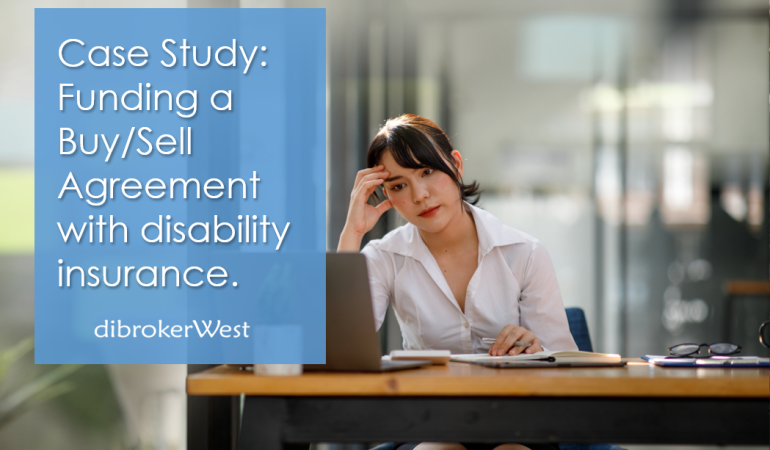
Case Study: How Disability Insurance Helped Fund a Buy-Sell Agreement
Using disability insurance to fund a buy-sell agreement, especially in a startup or fast-growing business, ensures that the legal, financial and insurance components are all in sync. One of our Regional Sales Rep recently worked with a business that highlighted just how easily things can fall out of alignment—and how disability buyout insurance can provide a much-needed safety net.
The Scenario: A Growing Business with a Buy-Sell Agreement Problem
Four partners, each with equal ownership in a business organized as an LLC but filing as an S Corp, approached us for guidance. They had a Buy-Sell Agreement in place and were looking to fund it with both life and disability insurance.
The company was only in its second year and while it had tremendous growth potential, it was still operating at a loss due to heavy startup expenses. They estimated the business was worth about $1 million and expected that value to multiply over the next few years.
The Discovery: A Flawed Valuation Method in the Buy-Sell Agreement
After reviewing their existing Buy-Sell Agreement, we noticed something concerning. The agreement used a phased valuation method based on EBITDA (Earnings Before Interest, Depreciation, Taxes, and Amortization):
- Years 1–2: Buyout price = capital contributions
- Years 3–4: Buyout price = 3x IBIDA
- Year 5 and beyond: Buyout price = 6x IBIDA
But with IBIDA currently at or near zero, any disability or death triggering the agreement during this stage would mean the buyout price was—on paper—zero. This was clearly not what the partners intended, but it posed a real financial and legal risk.
The Solution: Business Valuation and Fixed Buyout Values
To correct this, we partnered with one of our disability insurance carriers to provide a <link?> complimentary business valuation. With that valuation in hand, the business owners worked with their attorney to amend the agreement. Instead of relying solely on an EBITDA multiplier during the early years, they implemented fixed values that can be updated as the company grows.
This ensured that if a buy-sell event were to occur, a fair and fundable value would be used—regardless of temporary dips in profitability.
Why It Matters: The Role of an Insurance Advisor in Business Continuity Planning
This situation demonstrates why working with a proactive insurance advisor is so important. The CPA understood financials and the attorney drafted a technically sound agreement—but neither had identified how those provisions would function in a real-world disability scenario.
By aligning disability insurance planning with legal and financial advice, we have created a solution that protects all parties and ensures the Buy-Sell Agreement works when it’s needed most.
The Result: Peace of Mind and Financial Protection
Today, the business has a properly funded Buy-Sell Agreement with fixed valuations and the right mix of disability and life insurance coverage. The partners can move forward with confidence, knowing that should one of them face a serious illness or injury, the agreement will hold—and the business can continue smoothly without relying on company profits to finance the transition.
Key Takeaways for Business Owners and Advisors
- Always review the valuation method in your clients’ Buy-Sell Agreement—especially in the early years.
- Make sure agreements are fundable with proper insurance coverage.
- Use a business valuation to guide more accurate and practical planning.
- Work with an insurance advisor who understands both legal contracts and financial risks.




